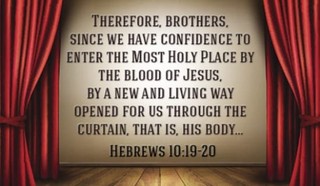- Recent Translations
- All Translations
Ebrei 10:1
Share
Settings
Ebrei 10:1 Meaning and Commentary
For the law having a shadow of good things to come
By which is meant not the moral law, for that is not a shadow of future blessings, but a system of precepts; the things it commands are not figuratively, but really good and honest; and are not obscure, but plain and easy to be understood; nor are they fleeting and passing away, as a shadow, but lasting and durable: but the ceremonial law is intended; this was a "shadow", a figure, a representation of something true, real, and substantial; was dark and obscure, yet had in it, and gave, some glimmering light; and was like a shadow, fleeting and transitory: and it was a shadow of good things; of Christ himself, who is the body, the sum and substance of it, and of the good things to come by him; as the expiation of sin, peace and reconciliation, a justifying righteousness, pardon of sin, and eternal life; these are said to be "to come", as they were under the former dispensation, while the ceremonial law was in force, and that shadow was in being, and the substance not as yet.
And not the very image of the things;
as it had not neither the things themselves, nor Christ, the substance of them, so it did not give a clear revelation of them, as is made in the Gospel, nor exhibit a distinct delineation of them, such as an image expresses; it only gave some short and dark hints of future good things, but did not exactly describe them: and therefore
can never with those sacrifices which they offered year by year
continually:
namely, the sacrifices of bullocks and goats, which were offered on the day of atonement, year after year, in successive generations, from the first appointment of that day, to the writing of this epistle: sacrifices of such a kind, and so often repeated, could never
make the comers thereunto perfect;
either the people that came to the temple, and brought them to the priests to offer them for them, or the priests that offered them; so the Syriac and Ethiopic versions render it, "perfect them that offer"; and if not one, then not the other: legal sacrifices could not make perfect expiation of sin; there is no proportion between them and sin: nor did they extend to all sin, and at most only typically expiated; nor could they justify and cleanse from sin. Contrary to this, the Jews F16 say,
``when Israel was in the holy land, there was no iniquity found in them, for the sacrifices which they offered every day stoned for them;''but spiritual sacrificers and worshippers were expiated, justified, and cleansed another way, even by the blood of Christ, slain from the foundation of the world in purpose, promise, and type, and to which their faith had respect in every sacrifice.
F16 Zohar in Gen. fol. 107. 1.

